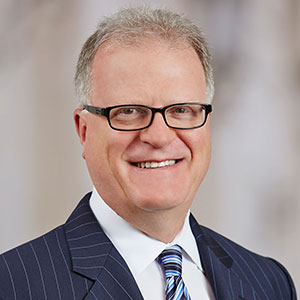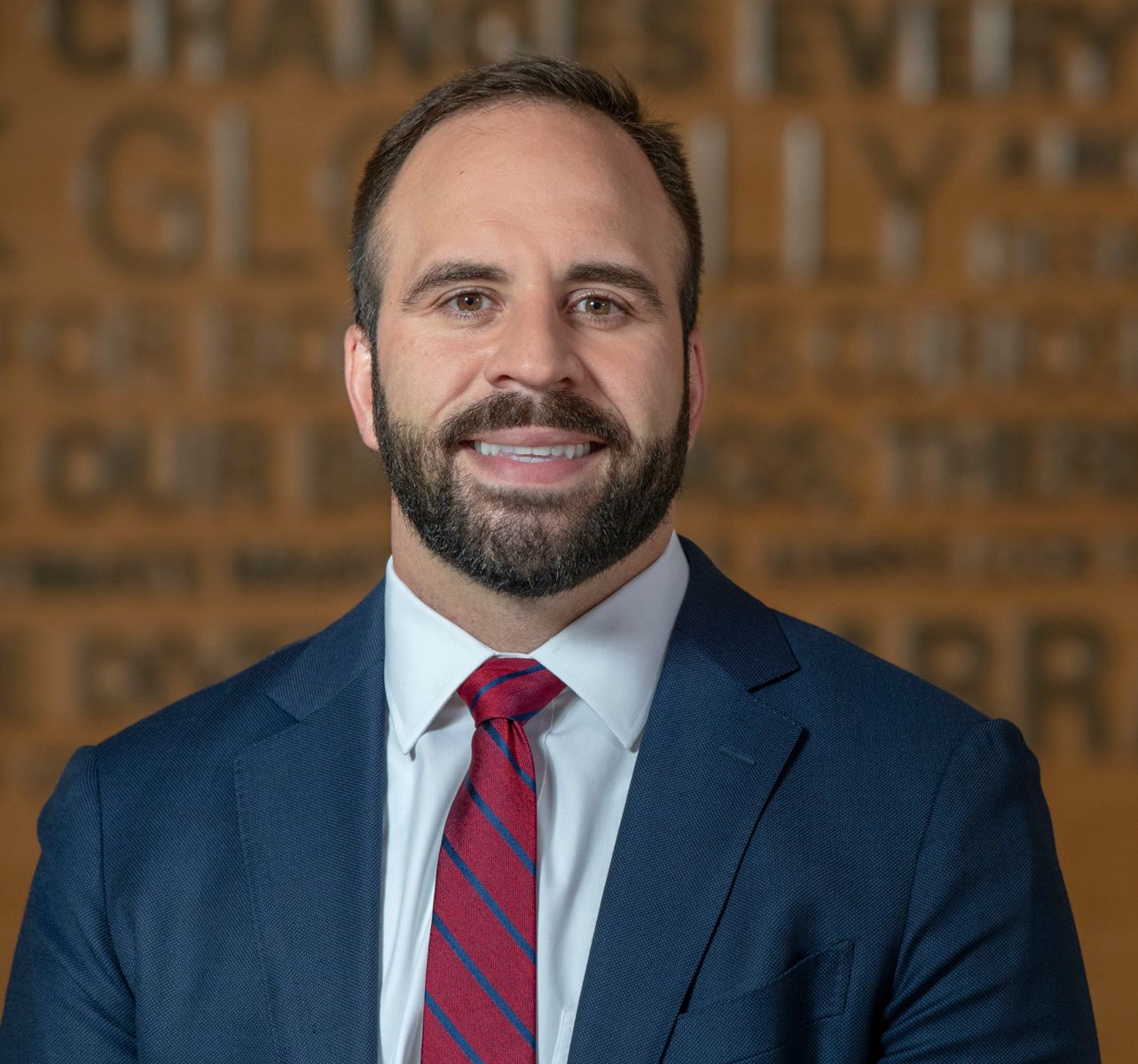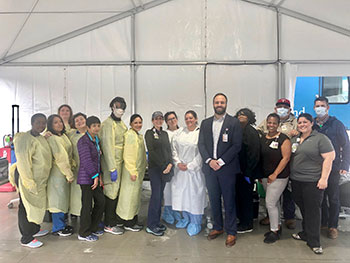The fight against COVID-19 continues across the globe, and Wabash College alumni like Joe Impicciche ’80 and Jared Lange ’08 are using their talents to make important decisions in keeping communities safe.
Impicciche, a Wabash political science major, is president and chief executive officer of Ascension, one of the leading nonprofit and Catholic health systems in the United States. In the role, which he has held since July 2019, Impicciche oversees Ascension’s healthcare operations and services, which includes 150 hospitals and more than 50 senior living facilities across 19 states and the District of Columbia.
Lange, an economics major, is the director of business sustainability and development for Parkland Health and Hospital System, one of the largest public hospital systems in the country with 835 operating beds and more than 10,000 employees. Lange’s responsibilities include driving business development initiatives, managing relationships between key stakeholders, and hospital leadership.
We caught up with these two administrators to learn more about what they are doing to battle the virus and how their Wabash educations helped prepare them for the fight.
 Q: What were your initial thoughts when news broke of this new virus and its spread?
Q: What were your initial thoughts when news broke of this new virus and its spread?
Impicciche: Ascension treated the third and fifth U.S. patients in Chicago. So, we knew how serious COVID-19 could be. One of the first things we did was set up an Ascension national Command Center to coordinate our response across our 2,600 sites of care. Our focus has been on patient safety and associate well-being from the beginning of the pandemic and that remains the case today.
Lange: There was a lot of uncertainty, and there still is a lot of uncertainty. The very first thing we wanted to do was test. I helped coordinate one of the first drive-thru testing sites here in north Texas, and the organization itself worked with Dallas County to later roll out larger sites. We were really at the forefront of testing thousands of people per day. We didn’t know we’d still be doing it almost a year later.
Q: How are you feeling now as vaccines are being rolled out?
Impicciche: I’m heartened to see that our workforce and caregivers around the country are being vaccinated. One of our caregivers said it was like receiving a “shot of hope.” We’re pleased with the rollout, though we’re seeing some signs of vaccine hesitancy. We’re doing everything we can to educate our caregivers and the community on the safety, efficacy, and importance of the vaccine.
Lange: There’s a lot of pressure, but it’s exciting at the same time. A lot of the news we see is people asking why immunizations are moving so slow. There was a lot to work through like how long is it good after you puncture a vial, how long is it good after you thaw it, can you thaw one vial at a time? And then from there, how do you communicate to the patients to let them know they are eligible for vaccination. A lot of it is logistics that hospitals across the country are working to figure out. Like with testing, once we get our legs underneath us, we’ll see exponential growth and vaccinations being utilized.
Q: What have been some of the challenges you have faced throughout this pandemic?
Impicciche: There really isn’t a playbook for how to deal with a global pandemic. It’s been 100 years since we’ve had an event of this scale. Every decision we’ve made over the past year has been guided by our main focus—our patients and our associates. Whether it has been chartering 737s to procure personal protective equipment and other supplies, avoiding layoffs and furloughs and protecting associate pay during the height of the initial surge, or finding new and creative ways to transition to a remote workforce and create transparent communications with them, I’m proud of the way our leadership team has responded to each challenge.
 Lange: The biggest challenge in the foreseeable future is addressing mental health and delayed surgeries. A lot of people are scared to come in or their appointments were deferred because of reduced scheduling when this first started. As an example, they may have been waiting two or three months to see a specialist, now it might take four or five months. There’s lots of delayed care. And with mental health, people are isolated. There’s no real connection with others at this time. I worry about how that’s going to impact us two, three, four years from now.
Lange: The biggest challenge in the foreseeable future is addressing mental health and delayed surgeries. A lot of people are scared to come in or their appointments were deferred because of reduced scheduling when this first started. As an example, they may have been waiting two or three months to see a specialist, now it might take four or five months. There’s lots of delayed care. And with mental health, people are isolated. There’s no real connection with others at this time. I worry about how that’s going to impact us two, three, four years from now.
Q: What have been the victories or greatest accomplishments, so far?
Impicciche: As I have often joked, I’ve had a busy “rookie season” as president and CEO of Ascension. We rolled out several programs with one goal in mind: to help alleviate some of the anxiety and uncertainty on our associates. They continue to do the heroic work of caring for those we serve every day. We implemented practices and benefits like pay protection early on, extended dependent care, paid for necessary hotel stays, established assistance funds to help pay for rent and groceries for those facing particular hardship.
Also, shortly after the George Floyd tragedy, I tasked members of my leadership team to develop a plan for Ascension to do our part to eliminate intolerance and discrimination and create a more diverse and inclusive culture.
Lange: Testing is a big one. Parkland tested more than 50% of Dallas County where we are located.
Our corporate communication team worked closely with an analytics company to identify individuals at high-risk based on geographic location, demographics, and clinical history. From there, we did outreach to patients to ask them how they were doing and encouraged testing for those who felt ill. We were proactive with the data and wanted to make sure people knew we were here as a resource for them.
Q: How did Wabash prepare you to be a part of this field that is now fighting a global pandemic?
Impicciche: I am convinced the personal attention I received from my professors at a very formative stage of my life has had a lasting impact on my leadership and also on who I am today. There is little formal preparation one can receive for an unprecedented pandemic, but my Wabash education provided a strong foundation for a career which has spanned more than 40 years now.
Lange: If you would have asked me 12 years ago if I thought I’d be in healthcare and in Dallas, I would have told you there’s no way. But the critical thinking and problem-solving skills I learned at Wabash got me here today.
 Official job titles and roles are trivial during a pandemic. What’s essential is the ability to lead and manage others, which Wabash College teaches how to lead effectively. The leadership lessons from Wabash granted me the opportunity to assist during an essential period.
Official job titles and roles are trivial during a pandemic. What’s essential is the ability to lead and manage others, which Wabash College teaches how to lead effectively. The leadership lessons from Wabash granted me the opportunity to assist during an essential period.
Q: What advice do you have for students looking to get involved and join the industry?
Impicciche: Healthcare is a wonderful career choice, one where you can really make a difference in the lives of others – whether it’s as a caregiver or in an administrative support role such as mine. I spent most of my career as a lawyer, including serving as the General Counsel for Ascension for 15 years. Working in healthcare has offered me a tremendous range of opportunities to contribute to our health ministry and serve others in a variety of ways. I have found a great deal of fulfillment both personally and professionally working in a field that is constantly evolving and transforming. There are new challenges every day in healthcare.
Lange: There are so many fields within health care. A lot of people just want to jump into hospital administration. I tell them you have to get your foot in the door first. I got my first health care job doing patient transportation, which sounds pretty straightforward but it’s very important. It’s a critical part of the hospital. Right out of college, I was transporting patients across the country from Denver to Tampa to Dallas. That was my way to understand how hospitals operate, which ultimately allowed me to be successful now.